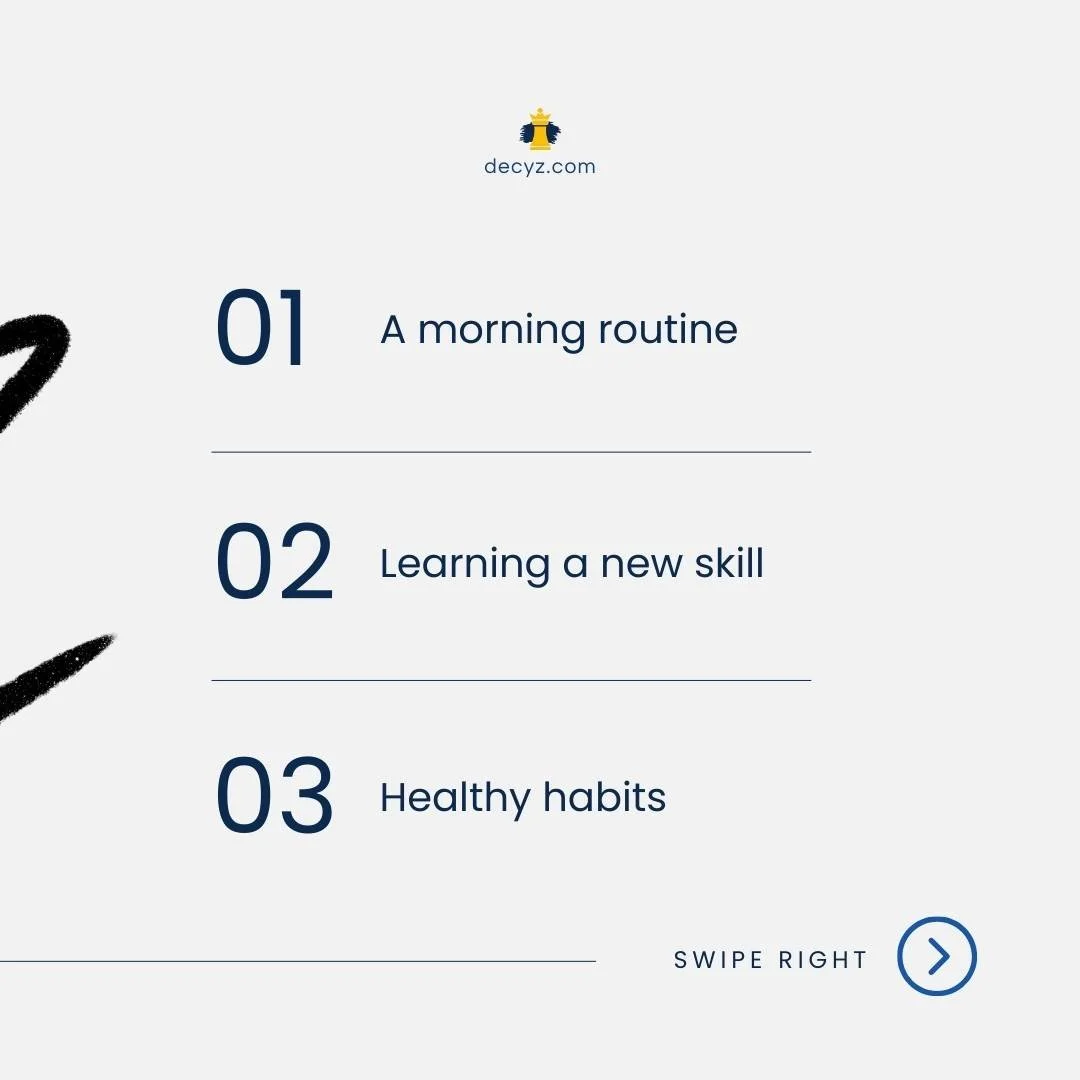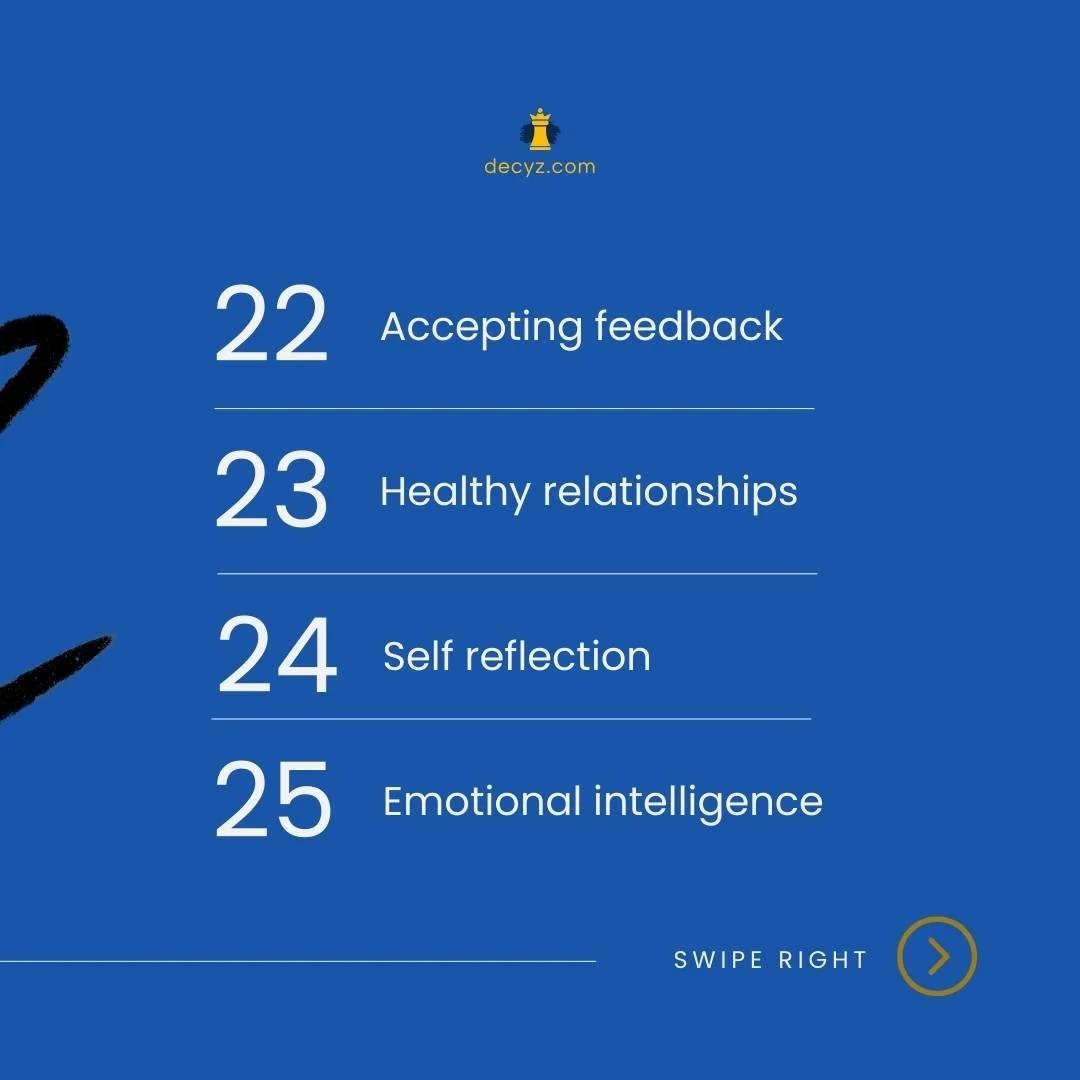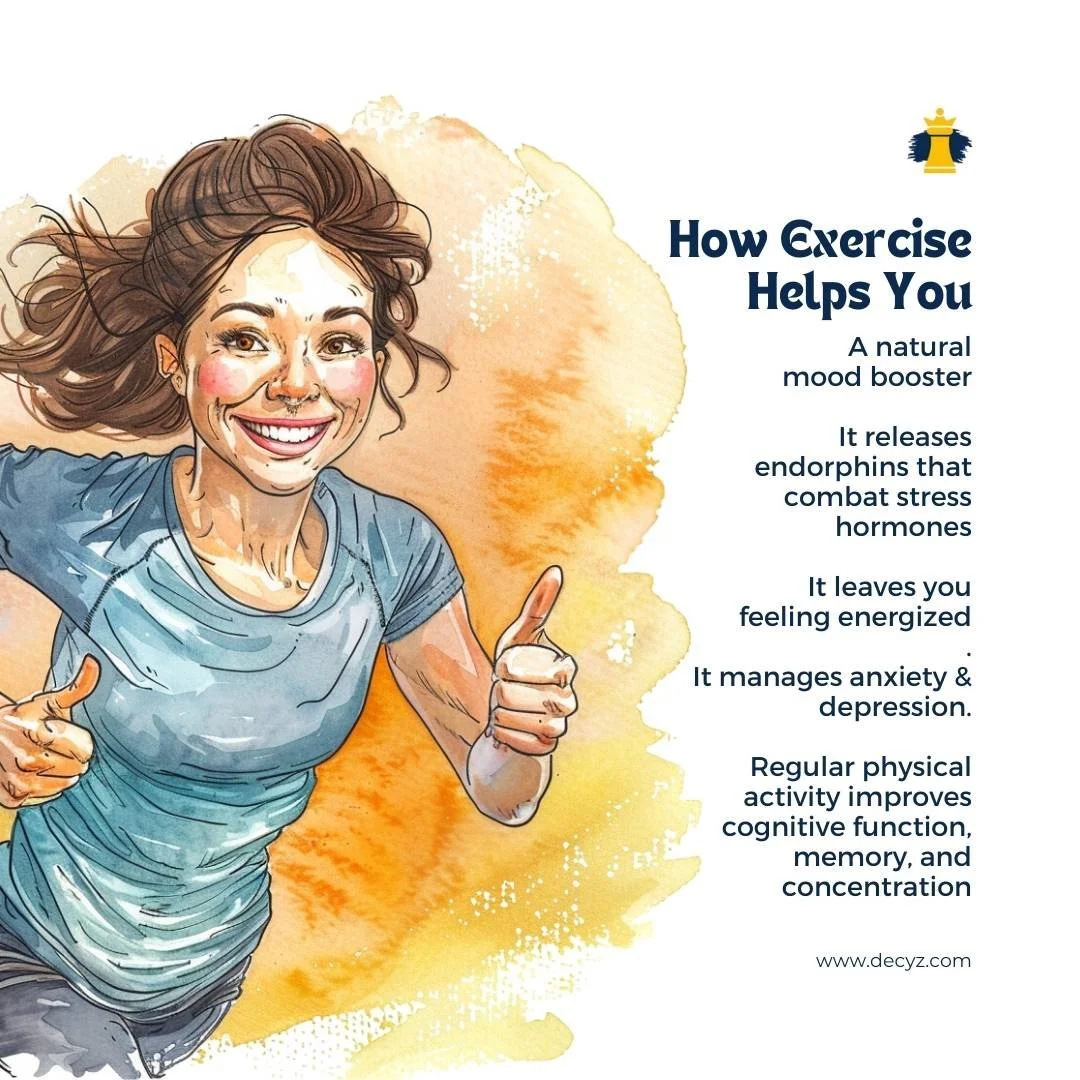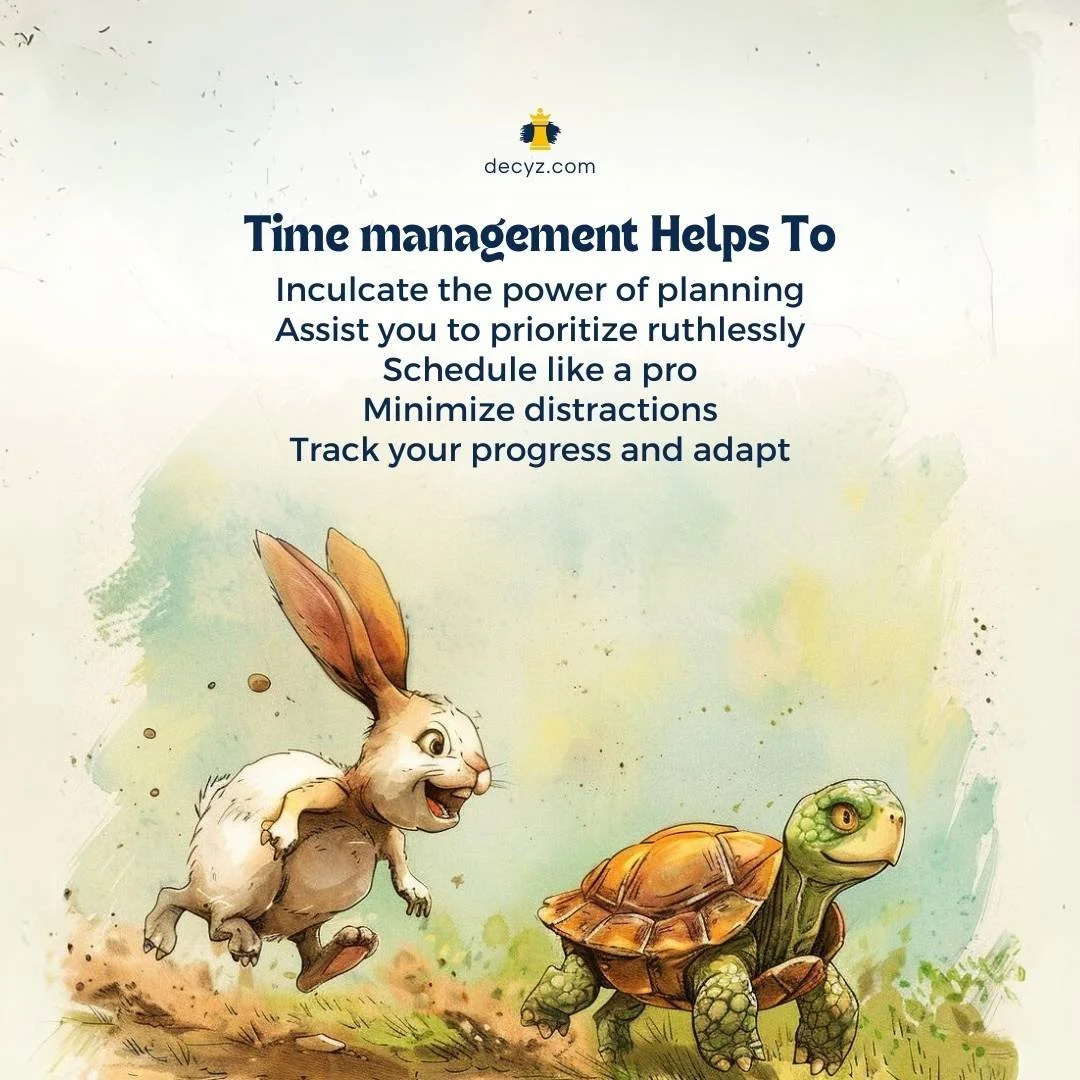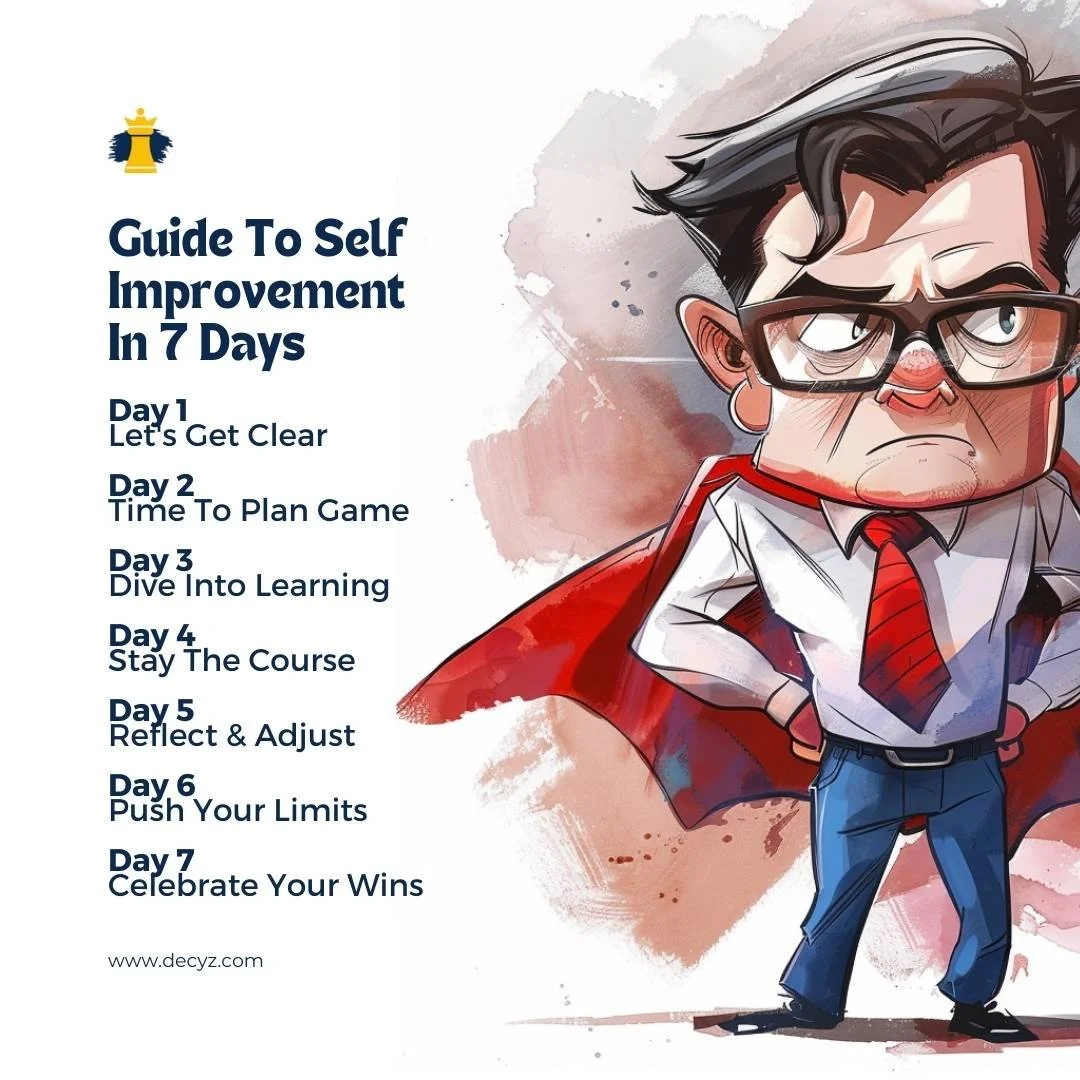25 Ways To Improve Yourself Into A Skilled, Groomed, Balanced You
Go in front of a mirror and look at yourself. How many things did you have a problem with? Was it the tummy bulge, the thinning hair, or the pimple that just popped up on your chin? Now go deeper. Think about what you did throughout the day. Did you finally replace the leaky pipe or put away the suitcase from your last trip?
We are often our harshest critics. Always finding areas where we lack and could’ve done better. This constant self-bashing has the opposite effect of what we are for, fueling us for the short term and then we find ourselves back in the same cycle of inaction.
Then there are those of us who think we are perfect and don’t need to improve ourselves. This also leads to inaction because we don’t think there’s anything we need to do.
The truth is that there's always room to improve yourself, and there are better ways to do it than the above examples. Like a house or a car needs regular maintenance, we also need to keep working on ourselves to unlock our full potential and keep improving.
But how do we do that? Finding the right balance is key. We need to acknowledge areas for growth without getting stuck in self-criticism. We also need to believe in ourselves to drive effective decision making in our personally and professionally.
This guide will equip you with the tools to navigate this balance, helping you develop a healthy self-awareness and a growth mindset. Discover effective strategies to improve yourself, maintaining the balance between realizing the need for improvement, boosting yourself, and taking action to become a better, stronger you.
A. Improve Yourself: Why It Matters
Have you ever noticed how some people seem to be constantly growing, learning, and achieving new things in life? It's like they have this inborn drive to become the best version of themselves. That's what it means to improve yourself.
Think of improving yourself as a journey, much like climbing a mountain. Every step you take gets you closer to the peak, but the journey itself is just as important as reaching the summit.
“The journey of a thousand miles begins with one step.”
One of the most incredible things about improving yourself is that it's a never-ending journey. There's always room to grow, to learn, and to evolve. And the beauty of it is that you have the power to define what improvement means to you. Whether it's becoming more compassionate, patient, or successful the choice is yours.
So, why should you improve yourself? Because each step you take toward self-improvement brings you closer to living a more meaningful and fulfilling life. It's about embracing the journey, learning from your experiences, and becoming the best version of yourself, one step at a time.
Below are a few reasons why you should work on improving yourself:
I. Unlocking New Opportunities
You know that feeling when you finally organize your messy desk and suddenly find that important document you've been searching for? Improving yourself works similarly. It opens doors to new opportunities to improve yourself that you might not have noticed before, whether it's a chance to learn a new skill or bloom in your career.
II. Boosting Confidence
Think about the last time you aced a recipe you've been wanting to try. Didn't it give you a little confidence boost? Improving yourself, whether it's mastering a hobby, learning a new language, or even just improving your posture, can do wonders for your self-confidence. It's like giving yourself a high-five every time you achieve something new.
III. Enhancing Relationships
Ever had a misunderstanding with a friend or family member that could have been avoided with better communication? Or an underlying conflict that has stayed the same because of your ego? Improving yourself can help you become a better listener, communicator, and friend, helping you identify mistakes and learn from them. It's like adding extra toppings to your favorite pizza - it just makes everything better.
IV. Personal Fulfillment
There was a time when I was stuck in a bad performance phase in cricket. Match after match, but I couldn’t score any runs. I worked hard on improving myself. Finally, I played a match-winning shot, and I remember feeling so fulfilled that all the past defeats did not seem to matter. They served as a lesson to develop and improve myself.
Improving yourself gives you a sense of accomplishment and fulfillment, knowing that you're continuously growing and evolving.
V. Adapting to Change
If you’re a reader like me, you would know what it feels like to read a mind-blowing plot twist. I usually close the book and take time to process it before accepting the sudden change.
Adapting to life's changes mirrors this. Initially surprising, we may need a moment to process before accepting the new reality. But, just as we eventually embrace the twist and continue reading, in life, we must adapt and move forward. This means acknowledging the change, finding its silver lining, and using it as an opportunity for growth and new experiences to improve yourself.
VI. Setting a Good Example
Ever noticed how kids often mimic the behaviors of adults around them? Recently, I've made a conscious effort to prioritize healthy habits like regular exercise. Now, when my kids see me lacing up my running shoes each morning, they've started joining in, eager to imitate this healthy lifestyle. It's incredibly rewarding to see them adopting these habits and knowing that I'm contributing to their growth by being the best version of myself.
These small habits act as a learning curve and motivation, helping you improve yourself and encourage others to improve as well.
Learning is a vital element of life, not just for kids but also for adults. Operating smartphones and computers comes naturally to the young generation today. Parents often ask their kids to figure out how to sort out the iCloud storage or configure settings. This is because as people grow older, they lose the willingness or the ability to learn new things.
But adapting to change and opening yourself to challenges can help you learn new things and improve yourself. Take the example of an uncle of mine. Computers became common when he was over 60. Most people of that age did not even bother to learn this new technology. However, he took up this challenge with the zeal and enthusiasm of a curious learner.
He took help from his grandkids, tutorials, and anyone willing to help till he was using a computer like a pro. This helped him stay relevant and ahead of the learning curve in an era that was fueled by technology.
By focusing on improving yourself, you're not only bettering yourself but also setting a positive example for those around you. It's like being the cool older sibling who inspires others to be their best selves.
So, whether it's organizing your closet, learning to cook a new dish, or simply practicing gratitude, every little step you take toward improving yourself brings you closer to living your best life
B. 25 Ways to Level Up: Your Personal Growth Checklist
Below is a handy checklist packed with 25 everyday ways to level up and boost your personal growth and improve yourself:
1. Morning Routine Mastery
It's a familiar scenario: you wake up tired, hit snooze a few too many times, and scramble out the door feeling rushed and frazzled. This sets the tone for a stressful day. But what if your mornings could be different? Making small tweaks to your routine, like getting enough sleep and incorporating some calming activities, can have a ripple effect, impacting your entire day with a sense of calm and focus.
Set a goal to wake up a little earlier, add some stretching or meditation, or simply savor your morning cup of coffee without rushing. Incorporating simple practices like waking up earlier, stretching, or savoring moments, enhances your overall well-being and allows you to improve yourself with small steps. These adjustments promote mindfulness, reduce stress, and increase productivity, setting the stage for a successful day ahead.
2. Learning A New Skill
Ever wanted to learn how to knit, play the guitar, or become a computer genius? Setting a goal to learn a new skill is like embarking on a DIY project - it's both challenging and rewarding. It expands your knowledge and capabilities, opening up new opportunities and boosting self-confidence to improve yourself.
However, it's also challenging, requiring dedication, patience, and overcoming obstacles along the way. Yet, the sense of accomplishment and personal growth that comes from mastering a new skill makes the journey truly fulfilling.
Dedicate some time each week to practicing your chosen skill, whether it's watching tutorial videos online, joining a class, or experimenting on your own to try to improve yourself in every area of your life.
3. Healthy Habits Makeover
Imagine feeling energized and vibrant every day ready to take on the world. Improving your health habits keeps your body running smoothly and efficiently, giving you the energy to improve yourself in other aspects of your life. This improves your physical well-being, enhancing mental clarity and emotional resilience, empowering you to tackle life's challenges with confidence and vitality and improve yourself.
Set goals to drink more water, try to eat more healthy meals, or commit to regular exercise, even if it's just a short walk around the block. I’ve experienced walking daily, morning or evening, giving your brain a reboot, the fresh air, the familiar routine of walking, and the time to just destress can be a game-changer for your mental and physical health.
4. Practice Mindfulness
Sometimes, it's good to pause for a moment to appreciate the beauty of a sunset or savoring each bite of your favorite dessert. Trying to develop mindfulness is like adding a splash of color to a black-and-white photo - it brings richness and depth to your everyday experiences, motivating you to approach life with enthusiasm and improve yourself.
It enables you to become more in tune with the present moment, fostering a deeper appreciation for life's beauty and a heightened sense of clarity in navigating its complexities. Set a goal to practice mindfulness daily, whether it's through meditation, deep breathing exercises, or simply being fully present in each moment, improving yourself to retain a sense of calm and peace for the day ahead.
5. Effective Communication Skills
Ever wished you could express yourself more clearly or listen more attentively to others? Enhancing your communication skills is a valuable asset in your skill set, improving yourself in both the personal and professional arena.
Just as a sharp blade cuts through obstacles effortlessly, refined communication skills allow you to navigate through challenges with finesse and clarity. Set a goal to practice active listening, express yourself assertively, or seek out opportunities to engage in meaningful conversations to improve yourself.
Following are actionable effective communication steps to get you started:
i. Practice Active Listening
Give the speaker your full attention, make eye contact, and ask clarifying questions to show you're engaged.
iI Express Yourself Assertively
Communicate your needs and opinions directly, but respectfully. Avoid passive-aggressive language and focus on "I" statements.
iII. Seek Opportunities to Engage
Step outside your comfort zone and initiate conversations with new people. Join a club or volunteer organization to practice your communication skills in real-world settings.
6. Financial Fitness
Feeling confident and in control of your finances is like a clever investor making strategic moves in the stock market. Improving your financial fitness is like balancing your budget - it ensures that your money is working for you, not against you, keeping you in charge of your life and stay on course to improve yourself.
Set goals to track your expenses, build an emergency fund, or invest in your future. For instance, setting a goal to track your expenses can shed light on where your money goes each month, allowing you to identify areas for potential savings and smarter spending habits.
Additionally, having savings or planning your finances ensures you have a safety blanket in situations that you can’t control, like losing your job, urgent medical expenses, or helping a family member or friend.
7. Reading Habit
Set aside at least 30 minutes each day to read a book or an article on a topic that interests you. It could be a classic novel, a non-fiction bestseller, or an informative blog post. Reading expands your knowledge, stimulates your imagination, and broadens your perspective on the world, equipping you with the tools to improve yourself in life.
Also, daily reading not only enriches your mind but also enhances your vocabulary and strengthens your cognitive abilities, ultimately contributing to lifelong learning and personal growth. It exposes you to diverse perspectives, opening your mind and refining your comprehension abilities, leading to a better understanding of yourself and the world around you.
8. Regular Exercise
Find an exercise routine that you enjoy and can stick to consistently. This could be anything from going for a quick walk, cycling, swimming, or attending fitness classes. Aim for at least 30 minutes of moderate-intensity exercise most days of the week. Regular exercise improves your physical health, but it also boosts your mood, reduces stress, and enhances your overall well-being, giving you the mental and physical clarity to improve yourself daily.
Regular exercise is a powerhouse for both your body and mind, it has the following benefits:
I. Physical Benefits
Improved cardiovascular health, stronger muscles and bones, increased energy levels, and better sleep quality.
II. Mental Benefits
Reduced stress and anxiety, improved mood and self-esteem, sharper cognitive function, and enhanced focus.
Exercise is a natural mood booster, releasing endorphins that combat stress hormones and leave you feeling energized and positive. It can also be a powerful tool for managing anxiety and depression. Additionally, regular physical activity has been shown to improve cognitive function, memory, and concentration, keeping your mind sharp for years to come.
9. Healthy Eating
Healthy eating isn't just about fitting into your favorite jeans; it's about providing your body and mind with the essential building blocks they need to thrive and improve themselves. Focusing on incorporating more whole, nutrient-rich foods like fruits, vegetables, whole grains, lean proteins, and healthy fats, you'll be supplying your body with the tools it needs to with the following:
Boost Energy Levels
Ditch the afternoon slump! Nutrient-rich foods provide sustained energy throughout the day, keeping you focused and productive.
Enhance Cognitive Function
A healthy diet supports brain health, improving memory, concentration, and overall cognitive performance.
Strengthen Your Immune System
Think of fruits and vegetables as nature's multivitamins, packed with antioxidants and essential vitamins that help your body fight off illness.
Improve Mood and Well-Being
Studies have shown a strong link between gut health and mental well-being. Eating a balanced diet rich in fiber and fermented foods can positively impact your mood and reduce symptoms of anxiety and depression.
Incorporating whole, nutrient-rich foods doesn't have to be bland or boring. Experiment with new recipes and cooking techniques to create delicious and satisfying meals that nourish your body and taste buds. Instead of viewing healthy eating as restrictive, think of it as an exciting journey to explore a world of vibrant flavors and textures.
10. Meditation
Dedicate a few minutes each day to practicing mindfulness meditation. Find a quiet, comfortable space where you won't be disturbed, and focus on your breath or a specific sensation in your body. When your mind wanders, gently bring your attention back to the present moment without judgment. Over time, mindfulness meditation can help reduce stress, increase self-awareness, and create a greater sense of inner peace and calm, giving you the clarity to identify areas of growth and improve yourself.
11. Journaling
Start a daily journaling practice to reflect on your thoughts, feelings, and experiences. Use your journal as a space to express yourself freely, explore your emotions, and gain knowledge in your life, setting the stage to improve yourself and your life.
Starting a daily journaling practice promotes positivity by fostering gratitude, processing emotions, and facilitating self-reflection and growth. You might write about your goals, dreams, challenges, or moments of gratitude. Journaling can serve as a powerful tool for self-discovery, self-expression, and personal growth to improve yourself in every way.
12. Limiting Screen Time
Set boundaries around your screen time to reduce distractions and prioritize activities that nourish your mind and soul to help improve yourself. Limiting screen time helps preserve mental clarity, reduces stress, and fosters meaningful connections with oneself and others, ultimately leading to a more balanced and fulfilling life.
For example, you might designate specific times of day for checking email and social media, and turn off notifications to minimize interruptions. Instead of mindlessly scrolling through your phone, spend quality time engaging in hobbies, spending time with loved ones, or enjoying the beauty of nature.
13. Learning a New Language
Challenge yourself to learn a new language, whether it's Spanish, French, Mandarin, or another language that interests you. Explore language-learning resources such as online courses, language apps, or conversation groups to practice speaking, reading, writing, and listening.
Learning a new language not only expands your communication skills but also opens up new opportunities for cultural exchange and personal growth to improve yourself. You gain insight into different cultures, broadening your perspective and fostering empathy and understanding.
14. Organization Skills
Develop systems and routines to keep your home, workspace, and schedule organized and clean. Invest in tools such as planners, calendars, storage solutions, and productivity apps to help you stay on top of your tasks and responsibilities and improve yourself.
For example, you might create daily to-do lists, declutter your living space, and establish a designated workspace free from distractions. Maintaining an organized environment can reduce stress and increase efficiency. With everything in its designated place, tasks become more manageable, allowing you to focus your time and energy on priorities, ultimately boosting productivity and efficiency and improving yourself.
15. Creative Expression
Make time for activities that allow you to express yourself creatively, whether it's painting, writing, playing music, dancing, or crafting. Set aside dedicated time each week to engage in your creative pursuits and let your imagination run wild.
Whether you're creating art for yourself or sharing it with others, creative expression promotes self-discovery, self-expression, and personal fulfillment. Sharing art also fosters connections with others, providing avenues for empathy, inspiration, and mutual appreciation, enriching both the creator and the audience, providing opportunities for self-growth, and improving yourself.
16. Stress Management Techniques
Feeling like you're drowning in deadlines, traffic jams, and a never-ending to-do list? It's a common experience. Stress is an inevitable part of life, but letting it control you can significantly impact your physical and mental health. The key lies in learning powerful tools to manage stress and cultivate inner peace and improve yourself.
Experiment with the following stress management techniques to improve yourself :
I. Deep Breathing
Focus on slow, controlled breaths, feeling your belly rise and fall with each inhale and exhale. This simple practice can quickly calm your nervous system and bring a sense of centeredness.
II. Progressive Muscle Relaxation
Tense and relax different muscle groups throughout your body, starting with your toes and working your way up. This technique releases physical tension associated with stress.
III. Guided Imagery
Close your eyes and visualize a peaceful scene, like a calming beach or a serene forest. Engage your senses by picturing the sights, sounds, and smells of your chosen location. This can help distract you from worries and promote relaxation.
IV. Mindfulness Meditation
Focus your attention on the present moment, observing your thoughts and feelings without judgment. This practice can increase self-awareness and reduce stress over time.
Stuck in rush hour traffic? Instead of letting frustration build, take a few deep breaths and focus on the sensation of your breath moving in and out. This simple technique can instantly reduce tension and make the commute a little less stressful.
Integrate these stress management techniques into your daily routine to cultivate a calmer mindset and enhanced resilience. Even small doses of stress management can have a positive impact on your overall well-being and help improve yourself.
17. Networking Skills
Maintain relationships with people who share your interests, goals, and values to expand your network and create opportunities for personal and professional growth that can pave the way to improve yourself. How does it work?
By nurturing connections with like-minded individuals, you gain access to the following:
Valuable Insights
Learn from others' experiences and perspectives, gaining fresh ideas and approaches to challenges.
New Opportunities
Expand your professional horizons by tapping into your network for potential job openings, collaborations, or mentorship opportunities.
Mutual Encouragement
Surround yourself with people who inspire you and hold you accountable, creating a powerful synergy that propels you towards your goals.
Think of your network as a web:
The stronger you weave it, the more support and opportunities you can access. Following are tips to actively build your network:
Reconnect with old friends and colleagues.
Attend industry events and conferences.
Join online communities or professional groups.
Volunteer for causes you care about.
Offer to mentor others in your field.
Remember, networking is a two-way street. Focus on building genuine connections, offering value to others, and fostering mutually beneficial relationships. These interactions create a supportive community where ideas flow freely, collaboration thrives, and mutual encouragement fosters personal and professional growth to improve yourself.
18. Time Management
Feeling overwhelmed by a mountain of tasks? Effective time management empowers you to conquer your to-do list, navigate your day with focus and efficiency and improve yourself. Here's how to transform from feeling scattered to feeling in control with the following time management tips:
1. Power of Planning
Start by creating a master list of all your tasks, both personal and professional. Break down larger projects into smaller, more manageable steps, each with a clear deadline.
2. Prioritize Ruthlessly
Not all tasks are created equal. Utilize a prioritization framework like the Eisenhower Matrix to categorize tasks based on urgency and importance. Focus on tackling high-impact tasks first and delegate or eliminate less critical ones.
3. Schedule Like a Pro
Block out dedicated time slots in your calendar for each task. Be realistic about the amount of time needed and factor in buffer periods for unexpected interruptions.
4. Silence the Noise
Minimize distractions by silencing notifications, setting aside specific times for email and social media, and working in an organized and clutter-free environment.
5. Track Your Progress and Adapt
Review your schedule throughout the day and adjust as needed. Track your time to identify areas for improvement and celebrate your wins along the way.
Effective time management isn't just about completing tasks; it's about creating space for what truly matters, allowing you to gain control of your schedule, reduce stress, and free up time to pursue your passions and personal goals and improve yourself in each task consistently.
19. Public Speaking
Public speaking can feel daunting, but it's a powerful skill that can unlock opportunities and amplify your impact, giving you the confidence to improve yourself. Here's how to transform yourself from a nervous presenter to a confident communicator using the following techniques:
A) Start Small & Passionate:
Don't jump on stage at a conference just yet. Begin by practicing short talks with small, supportive groups like friends, colleagues, or a local Toastmasters club. Choose topics you're passionate about – your enthusiasm will shine through and keep your audience engaged.
B) Craft Compelling Content:
Structure your talks with a clear introduction, engaging body, and memorable conclusion. Focus on delivering key messages that resonate with your audience and provide value.
C) Practice Makes Progress
Rehearse your delivery out loud, paying attention to pacing, vocal variety, and body language. Record yourself and watch the playback to identify areas for improvement.
D) Embrace the Power of Storytelling:
Weave personal stories, anecdotes, or data-driven examples into your talk. Storytelling connects with emotions, making your message more relatable and impactful.
E) Focus on Connection, Not Perfection:
Public speaking is about connecting with your audience, not achieving flawless delivery. Maintain eye contact, smile genuinely, and acknowledge your audience's energy. Even if you stumble, take a deep breath, and recover gracefully – your authenticity will shine through.
Public speaking isn't only about overcoming fear; it's about using your voice to inspire, educate, and influence others. It enables you to unlock your leadership potential, improve yourself, grow in your career, and make a positive impact on your personal and professional life
20. Courageous Risk-Taking
Improve yourself by stepping outside your comfort zone and embracing opportunities for growth and exploration to improve yourself. Calculated risks aren't about recklessness; they're about mindfully pushing your boundaries so you can do the following:
i) Confront Fears and Uncertainties:
Stepping outside your comfort zone helps you build resilience and develop the ability to adapt to new situations.
iI) Boost Confidence:
Successfully navigating challenges strengthens your belief in your abilities, fueling further growth and exploration.
iII) Spark Creativity and Innovation:
Stepping outside the familiar can spark new ideas and lead to creative breakthroughs that can improve yourself both personally and professionally.
Think about an area in your life where you've always wanted to grow
Perhaps learning a new language, starting a creative project, or taking on a leadership role at work. Take a calculated risk by enrolling in a class, joining a club, or volunteering for a new responsibility.
21. Setting Boundaries
Establishing healthy boundaries to protect your time, energy, and well-being. Learning to say "no" empowers you to prioritize what truly matters and avoid feeling overwhelmed or resentful.
Here's how setting boundaries helps you improve yourself:
1. Reduces Stress
By saying no to excessive demands, you create space for rest, relaxation, and activities that replenish your energy.
2. Improves Focus
When you limit distractions and unnecessary commitments, you can channel your energy into your most important tasks and goals.
3. Strengthens Relationships
Healthy boundaries foster mutual respect within your relationships, allowing you to show up more fully and authentically when you're present.
Think about an area in your life where you might struggle with saying no. Perhaps you feel obligated to take on extra work at the expense of your personal time, or you have difficulty declining social invitations that drain your energy.
For example, if work feels overwhelming, establish clear boundaries for when you're available, delegate tasks when possible, and break down big projects into smaller, manageable steps to maintain productivity while reducing stress to improve yourself one step at a time.
22. Gracious Acceptance of Feedback
Feedback is a valuable tool for growth and improving yourself. Shift your perspective – see feedback as an opportunity to identify blind spots, refine your skills, and slowly improve yourself to become your most optimal version.
Here's how to cultivate gracious acceptance of feedback with the following:
1. Listen Attentively
Pay close attention to the feedback, focusing on understanding the message rather than becoming defensive. Ask clarifying questions if needed.
2. Acknowledge and Thank
Express appreciation for the person taking the time to provide feedback, even if it's challenging to hear.
3. Reflect and Analyze
Take time to process the feedback objectively. Consider its validity and identify areas where you can genuinely improve.
4. Develop an Action Plan
Use the feedback to develop strategies for improvement. It could be taking a relevant course, seeking mentorship, or simply practicing a new skill.
The most successful people continuously seek feedback and actively work to improve themselves. For instance, if a coworker offers suggestions for improving your presentation skills, you might thank them for their input and incorporate their recommendations into your next presentation.
23. Healthy Relationships
Nurturing and strengthening the relationships that matter most as healthy relationships are a cornerstone of well-being, providing us with love, support, and a sense of belonging.
Here's how to invest in your relationships and improve yourself with the following steps.
1. Make Time for Loved Ones
Schedule regular quality time with friends, family, and romantic partners. This can be anything from a weekly phone call to a shared activity you all enjoy.
2. Practice Active Listening
Give your loved ones your full attention when they communicate. Make eye contact, avoid distractions, and ask clarifying questions to demonstrate you care about their thoughts and feelings.
3. Offer Support and Empathy
Be there for your loved ones during challenging times. Offer a listening ear, provide practical help when needed, and validate their emotions with empathy.
4. Communicate Effectively
Express gratitude for your loved ones and acknowledge their contributions to your life. Learn to navigate disagreements constructively, focusing on finding solutions rather than placing blame.
Investing time and effort into healthy relationships creates a strong support system that enriches your life and empowers you to improve yourself on all levels. Strong bonds foster a sense of connection, belonging, and purpose, all of which contribute to a more fulfilling and joyful life.
No matter how hectic our day is, my wife and I have set dinner as a family bonding time where we talk to the kids, connect with them, and connect. Once the kids are asleep, we always take some time just to talk or spend a few minutes even quietly so that we always remember where our priorities lie and why family and relationships are the most important part of our lives.
24. Self-Reflection
Schedule a regular time to introspect and examine your actions, thoughts, and emotions. This inward journey serves as a compass, guiding you toward continuous development.
Here's how to utilize self-reflection to improve yourself with the following:
Dedicate specific time slots for self-reflection, whether it's journaling in the morning or quiet contemplation before bed.
Reflect on both positive and challenging experiences. Consider what went well, what you could have improved, and what lessons you can learn from each situation.
Notice recurring themes in your thoughts, emotions, and behaviors. This can help you understand your triggers and develop strategies for navigating them more effectively.
Based on your reflections, set achievable goals for personal and professional development. Track your progress and celebrate your wins along the way.
Self-reflection isn't about dwelling on shortcomings; it's about gaining valuable insights and using them to improve yourself and become the best version of yourself. For example, after a challenging situation at work, you might reflect on how you handled it, what you could have done differently, and how you can apply those learnings in the future to improve yourself.
25. Emotional Intelligence
Improve yourself by cultivating emotional intelligence – the ability to understand and manage your own emotions, as well as recognize and respond to the emotions of others. This skill is essential for building strong relationships, navigating conflict effectively, and improve yourself in all facets of your life.
Here's how to develop your emotional intelligence:
Self-Awareness: Become attuned to your own emotions. Notice your physical sensations, thoughts, and behavioral triggers. Journaling or mindfulness exercises can be helpful tools for self-discovery.
Empathy: Develop your ability to see things from another person's perspective. Actively listen without judgment, validate their feelings, and offer support tailored to their needs.
For instance, when a friend shares their struggles with you, you might listen attentively, validate their feelings, and offer support without judgment. At that moment, your support can be the strength they need to hang on and not give up.
C. A Guide to Improve Yourself in 7 Days
You've got 7 days ahead of you, and each one is packed with potential for growth, learning, and maybe even a little adventure. Whether you're aiming to pick up a new skill, break a bad habit, or simply boost your mood, this is your chance to make it happen.
Following is a clear guide on how to improve in 7 days
Day 1: Let's Get Clear
Day 1 is all about setting the stage. Think about what you really want to achieve in the next 7 days. Maybe it's mastering a new recipe, getting better at a hobby, or even just improving your mood. For instance, you might decide you want to learn how to play a simple song on the guitar.
Learning a new skill is a way to improve yourself. It may seem challenging in the beginning, but if you dedicate time and energy to learning it, you will find it gets easier. Take some of the tips from above, setting a fixed time during the day, which can be 30 minutes, an hour, or even less, and organizing your schedule to master the new skill. The goal is to learn and improve yourself little by little, taking risks and celebrating the progress you make.
Day 2: Time to Game Plan
Now that you've got your goal in mind, it's time to break it down. What steps do you need to take to get there? So, if you're aiming to learn that guitar song, your plan might involve finding beginner tutorials online, practicing chords, and setting aside time to practice every day.
So you’re finding it challenging to focus and practice by yourself. Maybe you can’t get the finger coordination right or always hit the wrong tune. Talk to your family and friends, take feedback, or talk to others who are learning or already play the guitar. Then let go of the frustration, mediate, and reflect to come back even stronger.
Day 3: Dive into Learning
The third day is all about diving headfirst into learning something new. Maybe it's watching those guitar tutorials, reading up on music theory, or trying out different strumming patterns. The idea is to soak up as much knowledge as you can to help you reach your goal.
Now that you’ve centered yourself and have identified what you need to correct, take the risk to dive into learning the guitar without any fear or hesitancy. Eat something healthy, have your morning java, and clear your space, removing distractions with the techniques mentioned in the time management point above. Set a goal and aim to achieve it, whether it's part of the song or finger coordination.
Day 4: Stay the Course
Now we keep the momentum going. This day is about staying consistent with your plan. It might be tempting to slack off or get distracted, but remember why you started this journey in the first place. So, even if you're feeling a bit tired or unmotivated, push through and stick to your schedule.
Don’t be scared to take a break and gather your energy. Go for a walk, eat your favorite meal, or spend some time with the people you love. This will revitalize you, keeping you motivated and on the course of improving yourself till you master your new skill.
Day 5: Reflect and Adjust
Time to take a breather and reflect on how things are going. Have you been making progress toward your goal? What's been working well for you, and what could use a little adjustment? For instance, maybe you've realized you need to practice a particular chord progression more often to nail it down.
It happens. We all feel stuck when trying something new. Especially when we make some progress and can’t conquer the next challenge in our learning journey. Reflect on what you’ve achieved so far, journal your entries, stay in tune with your emotions, finding out how you can improve yourself further.
Day 6: Push Your Limits
Day 6 is all about stepping outside your comfort zone and pushing yourself a bit harder. Maybe it's attempting a more challenging guitar riff or trying out a new playing technique you've never attempted before. Remember, growth happens when you're willing to take risks and embrace new challenges.
The time for courageous risk-taking is here. You’ve learned the song you wanted and now you want to try something more challenging. Don’t be scared of taking risks. Instead, push yourself, step out of your comfort zone, and take the next step to improve yourself even more.
Day 7: Celebrate Your Wins
Congratulate yourself for making it to the last day! Take a moment to pat yourself on the back and celebrate your achievements, no matter how small. Maybe you finally nailed that guitar song, or even learned a little bit. Be proud of yourself, and use that positive energy to fuel your next adventure in self-improvement!
Give yourself a pat on your back for achieving your goal. Now you can improve your guitar playing skills even more and continue to excel or move towards a new hobby, skill, or path to keep on improving yourself.
D. Decyz POV on Improving Yourself
“You have within you right now, everything you need to deal with whatever the world can throw at you”
This quote from Canadian-American motivational speaker, Brian Tracy explains how each one of us possesses natural abilities and strengths to overcome challenges and cross life's obstacles.
At Decyz, we believe that within every person lies a reservoir of strength, resilience, and courage. It's the inherent capacity to face adversity, tackle problems, and persevere through difficult times. We can adapt, learn, and find creative solutions to problems. This is how we keep growing and learning. If we stop because of our fears, doubts, or risks, it leads to stagnation, inaction, and staying in the same place while the world around us grows and evolves.
In today's evolutionary world, it's imperative that the learning curve is on to ensure we are relevant with changing paradigms, technology, ways of working, challenges, problems, and solutions. Belief in ourselves is the first step towards improving yourself. Regardless of external circumstances or obstacles, we possess the inner resources and resilience needed to navigate life's challenges and achieve our goals.
“Believe in yourself and all that you are. Know that there is something inside you that is greater than any obstacle.”
So look at yourself in the mirror, and tell yourself that today is your new day. Your inner self desperately wants you to work on everything you’ve kept on your list for so long.





